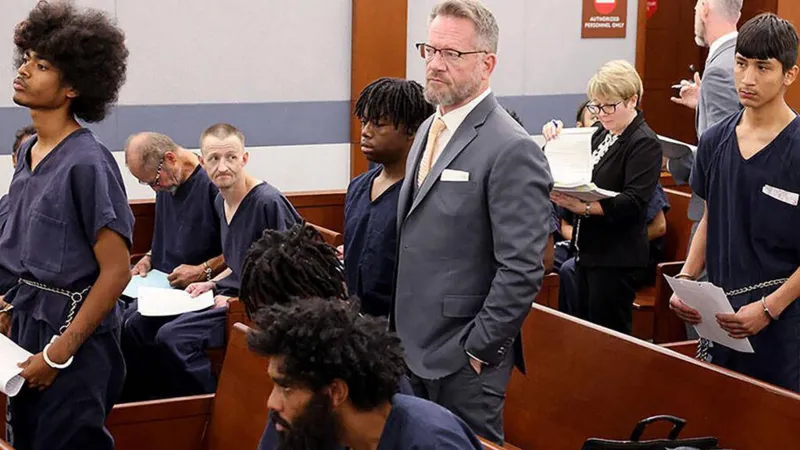In a case that shook the Las Vegas community, four teenagers have pleaded guilty to manslaughter in the beating death of their high school classmate, Jonathan Lewis Jr. The plea has led to strong criticism and grief, particularly from the victim’s family, who feel justice has not been fully served.
A brutal attack
17-year-old high school student Jonathan Lewis Jr. died after suffering severe head injuries in a brutal attack last November. The attack took place in an alley near Rancho High School and was reportedly over a dispute involving stolen headphones and vape pens. Witness accounts and social media footage revealed a shocking scene: Lewis, stripped of his shirt and dressed for a fight, was surrounded by a group of ten students. He was then brutally beaten, kicked and punched until he fell unconscious.
After being found by a passerby, Lewis was rushed to the school where staff performed CPR before being taken to the hospital. Despite medical efforts, he died six days later from injuries described by police as a “non-survivable head injury.”
Plea deal
Initially charged with second-degree murder, the four main defendants in the case—Trevion Randolph, Dontral Beavers, Gianni Robinson, and Damian Hernandez—recently reached a plea deal that reduced their charges to manslaughter. All were 16 or 17 years old at the time of the attack, although Hernandez is now 18. As a result of the plea deal, they will serve an unspecified period of time in juvenile detention.
The plea deal was reached in August and has received strong criticism from the community, particularly the victim’s family. Melissa Ready, Jonathan’s mother, expressed her outrage at the deal. She was not consulted or informed before it was finalized and believes the justice system has failed her son. “Nobody is really being punished fairly for killing my son,” she told the Las Vegas Review-Journal. “When they were kicking my child in the head, they knew he was going to die. They should be held accountable like adults.” Legal and community reactions The plea agreement has sparked a heated debate about fair sentencing for juvenile offenders. Nevada law allows children as young as 13 to be tried for serious crimes such as murder. However, those convicted in the juvenile system can only be detained until age 21, with the possibility of earlier release on parole if they complete a rehabilitation program. District Attorney Steve Wolfson defended the decision, saying the plea agreement was a pragmatic response to the complexities of the case. He emphasized that juvenile detention would provide the offenders with better resources for their rehabilitation. “This agreement balances the serious nature of the crime with the potential legal challenges that could arise from a trial,” Wolfson said. “The juvenile justice system is designed to meet the needs of young offenders and help them reintegrate into society.”
The case has also fueled criticism of the broader juvenile justice system. Critics argue that the system’s leniency minimizes the seriousness of violent crimes committed by minors. The same sentiment has been reiterated by Jonathan’s family and community members, who feel the plea deal represents a failure of justice.
A Tragic Legacy
Jonathan Lewis Jr.’s death has had a profound impact on his family, friends and the Las Vegas community. His mother’s grief is palpable, and the sense of injustice surrounding the plea deal has only deepened her grief. Jonathan was described by those who knew him as a kind and promising young man whose life was tragically cut short.
The community has rallied behind the Lewis family, expressing support and calling for reform of the juvenile justice system. The case has also highlighted the need for a broader discussion about how society deals with juvenile offenders, particularly those involved in violent crimes.
Looking Ahead
The aftermath of Jonathan Lewis Jr.’s death has brought to light important issues within the juvenile justice system. As the community grapples with the consequences of the plea deal, there are calls for a deeper examination of how such cases are handled and how the system can better deliver justice.
For the Lewis family, the pain of losing Jonathan is compounded by the feeling that the justice system has not adequately addressed the crime. Although the plea deal has resolved the immediate legal issues, it has left unanswered questions about accountability and justice for victims of violent crime.
As the case continues to resonate in the community, it serves as a stark reminder of the need for continued dialogue and reform in the juvenile justice system to ensure that it effectively balances rehabilitation with accountability.
